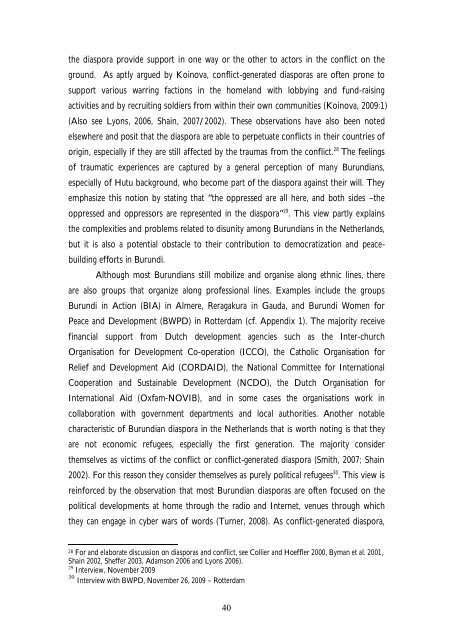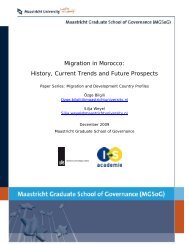Migration in Burundi: History, Current Trends and Future - MGSoG ...
Migration in Burundi: History, Current Trends and Future - MGSoG ...
Migration in Burundi: History, Current Trends and Future - MGSoG ...
You also want an ePaper? Increase the reach of your titles
YUMPU automatically turns print PDFs into web optimized ePapers that Google loves.
the diaspora provide support <strong>in</strong> one way or the other to actors <strong>in</strong> the conflict on the<br />
ground. As aptly argued by Ko<strong>in</strong>ova, conflict-generated diasporas are often prone to<br />
support various warr<strong>in</strong>g factions <strong>in</strong> the homel<strong>and</strong> with lobby<strong>in</strong>g <strong>and</strong> fund-rais<strong>in</strong>g<br />
activities <strong>and</strong> by recruit<strong>in</strong>g soldiers from with<strong>in</strong> their own communities (Ko<strong>in</strong>ova, 2009:1)<br />
(Also see Lyons, 2006, Sha<strong>in</strong>, 2007/2002). These observations have also been noted<br />
elsewhere <strong>and</strong> posit that the diaspora are able to perpetuate conflicts <strong>in</strong> their countries of<br />
orig<strong>in</strong>, especially if they are still affected by the traumas from the conflict. 28 The feel<strong>in</strong>gs<br />
of traumatic experiences are captured by a general perception of many <strong>Burundi</strong>ans,<br />
especially of Hutu background, who become part of the diaspora aga<strong>in</strong>st their will. They<br />
emphasize this notion by stat<strong>in</strong>g that “the oppressed are all here, <strong>and</strong> both sides –the<br />
oppressed <strong>and</strong> oppressors are represented <strong>in</strong> the diaspora” 29 . This view partly expla<strong>in</strong>s<br />
the complexities <strong>and</strong> problems related to disunity among <strong>Burundi</strong>ans <strong>in</strong> the Netherl<strong>and</strong>s,<br />
but it is also a potential obstacle to their contribution to democratization <strong>and</strong> peace-<br />
build<strong>in</strong>g efforts <strong>in</strong> <strong>Burundi</strong>.<br />
Although most <strong>Burundi</strong>ans still mobilize <strong>and</strong> organise along ethnic l<strong>in</strong>es, there<br />
are also groups that organize along professional l<strong>in</strong>es. Examples <strong>in</strong>clude the groups<br />
<strong>Burundi</strong> <strong>in</strong> Action (BIA) <strong>in</strong> Almere, Reragakura <strong>in</strong> Gauda, <strong>and</strong> <strong>Burundi</strong> Women for<br />
Peace <strong>and</strong> Development (BWPD) <strong>in</strong> Rotterdam (cf. Appendix 1). The majority receive<br />
f<strong>in</strong>ancial support from Dutch development agencies such as the Inter-church<br />
Organisation for Development Co-operation (ICCO), the Catholic Organisation for<br />
Relief <strong>and</strong> Development Aid (CORDAID), the National Committee for International<br />
Cooperation <strong>and</strong> Susta<strong>in</strong>able Development (NCDO), the Dutch Organisation for<br />
International Aid (Oxfam-NOVIB), <strong>and</strong> <strong>in</strong> some cases the organisations work <strong>in</strong><br />
collaboration with government departments <strong>and</strong> local authorities. Another notable<br />
characteristic of <strong>Burundi</strong>an diaspora <strong>in</strong> the Netherl<strong>and</strong>s that is worth not<strong>in</strong>g is that they<br />
are not economic refugees, especially the first generation. The majority consider<br />
themselves as victims of the conflict or conflict-generated diaspora (Smith, 2007; Sha<strong>in</strong><br />
2002). For this reason they consider themselves as purely political refugees 30 . This view is<br />
re<strong>in</strong>forced by the observation that most <strong>Burundi</strong>an diasporas are often focused on the<br />
political developments at home through the radio <strong>and</strong> Internet, venues through which<br />
they can engage <strong>in</strong> cyber wars of words (Turner, 2008). As conflict-generated diaspora,<br />
28 For <strong>and</strong> elaborate discussion on diasporas <strong>and</strong> conflict, see Collier <strong>and</strong> Hoeffler 2000, Byman et al. 2001,<br />
Sha<strong>in</strong> 2002, Sheffer 2003, Adamson 2006 <strong>and</strong> Lyons 2006).<br />
29 Interview, November 2009<br />
30 Interview with BWPD, November 26, 2009 – Rotterdam<br />
40



